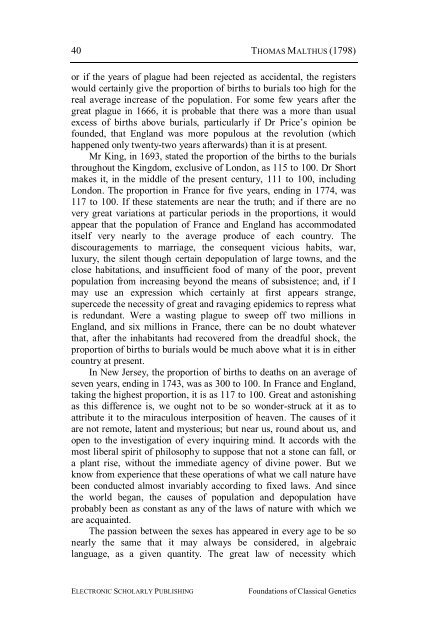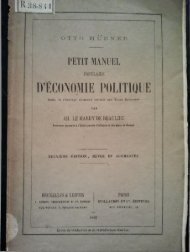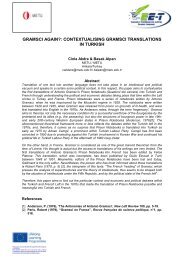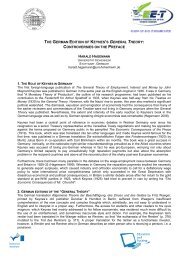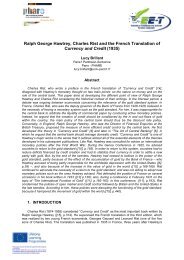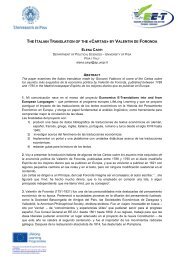Malthus, Thomas, Robert, An Essay on the Principle of Population ...
Malthus, Thomas, Robert, An Essay on the Principle of Population ...
Malthus, Thomas, Robert, An Essay on the Principle of Population ...
Create successful ePaper yourself
Turn your PDF publications into a flip-book with our unique Google optimized e-Paper software.
40 THOMAS MALTHUS (1798)<br />
or if <strong>the</strong> years <strong>of</strong> plague had been rejected as accidental, <strong>the</strong> registers<br />
would certainly give <strong>the</strong> proporti<strong>on</strong> <strong>of</strong> births to burials too high for <strong>the</strong><br />
real average increase <strong>of</strong> <strong>the</strong> populati<strong>on</strong>. For some few years after <strong>the</strong><br />
great plague in 1666, it is probable that <strong>the</strong>re was a more than usual<br />
excess <strong>of</strong> births above burials, particularly if Dr Price’s opini<strong>on</strong> be<br />
founded, that England was more populous at <strong>the</strong> revoluti<strong>on</strong> (which<br />
happened <strong>on</strong>ly twenty-two years afterwards) than it is at present.<br />
Mr King, in 1693, stated <strong>the</strong> proporti<strong>on</strong> <strong>of</strong> <strong>the</strong> births to <strong>the</strong> burials<br />
throughout <strong>the</strong> Kingdom, exclusive <strong>of</strong> L<strong>on</strong>d<strong>on</strong>, as 115 to 100. Dr Short<br />
makes it, in <strong>the</strong> middle <strong>of</strong> <strong>the</strong> present century, 111 to 100, including<br />
L<strong>on</strong>d<strong>on</strong>. The proporti<strong>on</strong> in France for five years, ending in 1774, was<br />
117 to 100. If <strong>the</strong>se statements are near <strong>the</strong> truth; and if <strong>the</strong>re are no<br />
very great variati<strong>on</strong>s at particular periods in <strong>the</strong> proporti<strong>on</strong>s, it would<br />
appear that <strong>the</strong> populati<strong>on</strong> <strong>of</strong> France and England has accommodated<br />
itself very nearly to <strong>the</strong> average produce <strong>of</strong> each country. The<br />
discouragements to marriage, <strong>the</strong> c<strong>on</strong>sequent vicious habits, war,<br />
luxury, <strong>the</strong> silent though certain depopulati<strong>on</strong> <strong>of</strong> large towns, and <strong>the</strong><br />
close habitati<strong>on</strong>s, and insufficient food <strong>of</strong> many <strong>of</strong> <strong>the</strong> poor, prevent<br />
populati<strong>on</strong> from increasing bey<strong>on</strong>d <strong>the</strong> means <strong>of</strong> subsistence; and, if I<br />
may use an expressi<strong>on</strong> which certainly at first appears strange,<br />
supercede <strong>the</strong> necessity <strong>of</strong> great and ravaging epidemics to repress what<br />
is redundant. Were a wasting plague to sweep <strong>of</strong>f two milli<strong>on</strong>s in<br />
England, and six milli<strong>on</strong>s in France, <strong>the</strong>re can be no doubt whatever<br />
that, after <strong>the</strong> inhabitants had recovered from <strong>the</strong> dreadful shock, <strong>the</strong><br />
proporti<strong>on</strong> <strong>of</strong> births to burials would be much above what it is in ei<strong>the</strong>r<br />
country at present.<br />
In New Jersey, <strong>the</strong> proporti<strong>on</strong> <strong>of</strong> births to deaths <strong>on</strong> an average <strong>of</strong><br />
seven years, ending in 1743, was as 300 to 100. In France and England,<br />
taking <strong>the</strong> highest proporti<strong>on</strong>, it is as 117 to 100. Great and ast<strong>on</strong>ishing<br />
as this difference is, we ought not to be so w<strong>on</strong>der-struck at it as to<br />
attribute it to <strong>the</strong> miraculous interpositi<strong>on</strong> <strong>of</strong> heaven. The causes <strong>of</strong> it<br />
are not remote, latent and mysterious; but near us, round about us, and<br />
open to <strong>the</strong> investigati<strong>on</strong> <strong>of</strong> every inquiring mind. It accords with <strong>the</strong><br />
most liberal spirit <strong>of</strong> philosophy to suppose that not a st<strong>on</strong>e can fall, or<br />
a plant rise, without <strong>the</strong> immediate agency <strong>of</strong> divine power. But we<br />
know from experience that <strong>the</strong>se operati<strong>on</strong>s <strong>of</strong> what we call nature have<br />
been c<strong>on</strong>ducted almost invariably according to fixed laws. <str<strong>on</strong>g>An</str<strong>on</strong>g>d since<br />
<strong>the</strong> world began, <strong>the</strong> causes <strong>of</strong> populati<strong>on</strong> and depopulati<strong>on</strong> have<br />
probably been as c<strong>on</strong>stant as any <strong>of</strong> <strong>the</strong> laws <strong>of</strong> nature with which we<br />
are acquainted.<br />
The passi<strong>on</strong> between <strong>the</strong> sexes has appeared in every age to be so<br />
nearly <strong>the</strong> same that it may always be c<strong>on</strong>sidered, in algebraic<br />
language, as a given quantity. The great law <strong>of</strong> necessity which<br />
ELECTRONIC SCHOLARLY PUBLISHING<br />
Foundati<strong>on</strong>s <strong>of</strong> Classical Genetics


